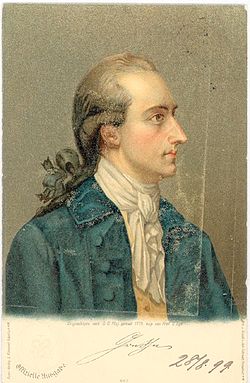Encounter with Werther
| Movie | |
|---|---|
| Original title | Encounter with Werther |
| Country of production | Germany |
| original language | German |
| Publishing year | 1949 |
| length | 88 minutes |
| Age rating | FSK 16 |
| Rod | |
| Director | Karl-Heinz Stroux |
| script | Karl-Heinz Stroux, Hermann Gressieker |
| production | Nova film production, Wiesbaden ( Georg Fiebiger ) |
| music | Wolfgang Fortner |
| camera |
Friedl Behn-Grund , Ernst W. Kalinke |
| cut | Erwin Niecke |
| occupation | |
and Hans Reiser , Erika Georgi , Hans Pössenbacher , Klaus Behrendt , Heinz Burkhardt , Herbert Gernot , Martha Kunig-Rinach | |
Encounter with Werther is a German film adaptation of Goethe from 1949 by theater director Karl-Heinz Stroux with Horst Caspar in the title role. Lotte plays Heidemarie Hatheyer . The film was produced on the occasion of the German poet's 200th birthday.

action
The film largely adheres to the literary model The Sorrows of Young Werther - also in terms of its verbosity . At the center of the action is the enthusiastic titular hero who one day meets young Lotte at a village festival and suddenly falls in love with her. However, Lotte is no longer free, but engaged to Albert, whom she also intends to marry. For Werther, this realization means that his love is without hope, a fall into the abyss. He goes away so that he can forget Lotte ...
During this time he earned his living as a court assessor. But one day Werther moved back to his old home. Here he finds out that Lotte is married to Albert, albeit unhappy. Werther's love for Lotte quickly rekindles, and this time the young wife does not seem completely averse. But conventions prevail: Lotte does not feel able to leave her husband Albert, and so everything stays the same. In the deepest desperation, Werther then shoots himself.
Production notes and awards
The encounter with Werther took place in the winter of 1948/49 in the Munich-Geiselgasteig studio as well as in Limburg , Wetzlar and Marburg an der Lahn . The film premiered on August 5, 1949 in Wuppertal . The (West) Berlin premiere was on October 15, 1949. The film was, after Helmut Käutner's cabaret film Der Apfel ist ab , the second most expensive West German post-war production from 1946 to 1949.
The scenic designs came from Herta Boehm , Gustaf Gründgens ' long-time stage designer. Paul Markwitz was responsible for the film construction, Brigitte Götting for the costumes. The native Czech Karl Lieffen made his film debut here.
Some of the actors involved here (including Rudolf Reiff , Friedrich Siemers and Karl Lieffen) were working under Stroux's direction at the Wiesbaden State Theater at the time of shooting .
This film was the second screen production after The Great Mandarin that the theater man Stroux shot in quick succession for the small Wiesbaden company Nova-Film Georg Fiebigers . And like The Great Mandarin , the encounter with Werther was a huge critic and box office flop.
Reviews
The film was mostly panned by the critics, especially the theatrical and “ecstatic way of playing” of the stage star Horst Caspar and the stage-like, static direction.
In the edition of August 11, 1949, Der Spiegel read: “Between a romantic nature, cozy and cozy Lotte house and gallantly cold royal courts, Stroux rolled out the fate of Werther and Lotte, the 'eternally valid' story of the young man, who is consumed and ruined in the hopeless, unfulfilled love for an already engaged, later married woman. The camera follows the love and enthusiasm of young Werther down to the most insignificant details. Finally, the day he and Lotte kiss for the first time. In the horror of the next morning he looks again at Lotte's silhouette, presses the ribbon that she gave him to his heart again and shoots himself. "
In Curt Riess ' Das There's only once it says: “The dialogue comes from a certain Goethe. And this is where the difficulties begin. Because of course one does not want to delete any of the precious words of the great Goethe. So the script is literally overloaded with dialogues. And every expert sees that this film is far too chatty to have an impact at all ... The director is Karl Heinz Stroux, one of the first German theater directors at this time. (...) He falls into the mistake of so many theater directors, namely filming the theater. He has his actors declaimed. This is particularly bad in the case of Horst Caspar. He doesn't even know the concept of underplaying - so important in film - at all. With him everything is a statement, a scream, with him every word is thrown out into space, so to speak, with particular concentration and loudness ”.
In the lexicon of international film it says: “Literarily endeavored, but uninspired and stylistically clumsy film adaptation of Goethe's autobiographical youth novel 'The Sorrows of Young Werther' (1774). One of the theater director Stroux's rare detours into the medium of film. "
Individual evidence
- ^ Alfred Bauer: German feature film Almanach. Volume 2: 1946-1955 , p. 41
- ↑ Pappmond on suffering and love . Report in Der Spiegel, 33/1949
- ↑ Der Spiegel, 33/1949
- ^ Encounter with Werther on Der Spiegel, 33/1949
- ↑ Curt Riess: There's only one. The book of German film after 1945. Henri Nannen Verlag, Hamburg 1958, p. 290
- ^ Meeting with Werther. In: Lexicon of International Films . Film service , accessed March 4, 2019 .
Web links
- Encounter with Werther in the Internet Movie Database (English)
- Encounter with Werther at filmportal.de
